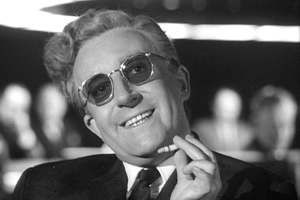
Dr. Strangelove Or: How I Learned To Stop Worrying And Love The Bomb
- 1964 film
Dark comic satire about the Cold War and mutually-assured nuclear destruction between the USA and USSR. Stars Peter Sellers, George C. Scott, Sterling Hayden, Keenan Wynn, Slim Pickens and more.
Press clippings
Peter Sellers, Stanley Kubrick and the battle to stop Dr Strangelove from bombing
How a control-freak director and his maniacal star defied terrified studio executives and onset injuries to make comedy gold from Armageddon.
Tim Robey, The Telegraph, 29th October 2024Dr Strangelove and the Seven Dwarves of Armageddon
Matthew Alford questions the establishment-pleasing politics that underlie so-called "political satire".
Matthew Alford, Morning Star, 17th October 2024Dr Strangelove at 60: is this still the greatest big-screen satire?
Stanley Kubrick's sharp and persuasive comedy about nuclear war remains a sharp and hilarious act of provocation.
Scott Tobias, The Guardian, 29th January 2024Dr. Strangelove was a nightmare comedy. Time forgot the nightmare part.
Stanley Kubrick's feature is such a sidesplitting laugh riot that, sixty years later, the radioactive level of fear and trembling in the atmosphere may have dissipated - unless you were there at the time.
Thomas Doherty, Hollywood Reporter, 29th January 2024Dr Strangelove adapted for the stage
Stanley Kubrick's Dr Strangelove will be adapted for the stage for the first time ever, with Armando Iannucci co-writing the new West End version with director Sean Foley.
British Comedy Guide, 15th July 2023The moment when Kubrick realised that Dr. Strangelove was a comedy
Based on a thriller novel called Red Alert by Peter George, Dr. Strangelove is probably the most hilariously surreal deconstruction of the military-industrial complex which exposes its hypocrisies and insecurities in a beautifully dark way. However, when Kubrick started the project, he had wanted to make a very serious take on the dangers of nuclear warfare. Instead, Kubrick soon realised that the satirical potential of such an adaptation was far greater than any film which approached such a grotesque topic with a serious voice.
Swapnil Dhruv Bose, Far Out, 31st December 2021Dr Strangelove review
Age has not withered the queasy nightmare of Stanley Kubrick's nuclear holocaust satire, starring Peter Sellers at the peak of his powers.
Peter Bradshaw, The Guardian, 15th May 2019In 1964, Stanley Kubrick, Terry Southern and Peter Sellers were on hand to make us feel better about the end of the world as we knew it, and about the psychopathic childishness of our military betters. There had been nothing in comedy like Dr Strangelove ever before. All the gods before whom the America of the stolid, paranoid 50s had genuflected - the Bomb, the Pentagon, the National Security State, the president himself, Texan masculinity and the alleged Commie menace of water-fluoridation - went into the wood-chipper and never got the same respect ever again.
Southern, in particular, was wise to the nonsensical macho posturing of the US military-industrial complex, and had no time whatsoever for the uniformed ignoramuses pontificating about mutually assured destruction, fail-safe trajectories and world targets in megadeaths (as one top-secret file is named). Thus he makes General Jack Ripper (Sterling Hayden) a barmy, paranoid repository for every last idiocy the military was spitting out at each new press conference on Vietnam or nuclear-attack policies.
And if you think General Ripper is an over-the-top slur on the good name of America's military might, then you've never come across the real-life head of strategic air command, US Air Force General Curtis "Bombs Away" LeMay - as floridly insane as any character in Strangelove.
No wonder the audiences' initial reaction was one of horror that these verities should be questioned, or such figures ridiculed. Once they got over that, they never stopped laughing, and one small, important cornerstone of the nation's respect for the military was smartly tugged out, leaving the destruction of the edifice itself to the war planners. They would tear it down without the aid of satire before the decade was out. A comic masterpiece that's also deeply serious and perceptive about the mad military mindset of those times, Dr Strangelove's genius endures even as we bury the weapons we once feared so much.
John Patterson, The Guardian, 11th October 2013Top 10 comedy movies
A selection of the top ten comedy movies from the UK and USA. The British films in the list are Monty Python: The Life of Brian, Dr. Strangelove Or: How I Learned To Stop Worrying And Love The Bomb, The Ladykillers and Borat: Cultural Learnings Of America For Make Benefit Glorious Nation Of Kazakhstan.
The Guardian, 11th October 2013